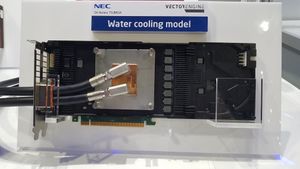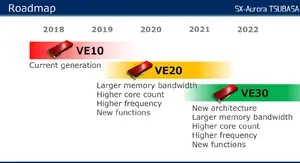| NEC Vector Engine | |
| Developer | NEC |
| Manufacturer | TSMC |
| Type | Vector processors |
| Introduction | 2017 (announced) |
| Production | 2018 |
| µarch | SX-Aurora |
| Word size | 64 bit 8 octets
16 nibbles |
| Process | 16 nm 0.016 μm
1.6e-5 mm |
| Technology | CMOS |
Vector Engine (VE) is a family of vector processors designed as PCIe accelerator cards designed by NEC.
Overview
NEC introduced the Vector Engine (VE) in 2017 as the successor to the SX line of supercomputers. VEs depart from all prior generations by departing from the traditional self-hosted vector processor and nodes. With the introduction of the Vector Engine, NEC moved to an accelerator card architecture whereby a Vector Engine (VE) PCIe card are installed onto standard x86 server which serves as the Vector Host (VH).
Members
Type 10
- See also: SX-Aurora
Vector Engine Type 10 (VE10) are first-generation Vector Engines. Those processors are based on the SX-Aurora microarchitecture and are fabricated on TSMC 16 nm process. Type 10 features eight vector cores along with six HBM2 stacks.
- Proc 16 nm process
- Mem 24 GiB / 48 GiB
- HBM 4-Hi (750 GB/s) / 8-Hi (1.2 TB/s) HBM2
- Perf 2.150-2.458 teraFLOPS
Type 10E
- See also: SX-Aurora
Type 10 E was announced in late 2019 and entered production in early 2020. The new cards offer similar specifications to the prior generation but offer higher memory bandwidth (E for enhanced memory bandwidth).
- Proc 16 nm process
- Mem 24 GiB / 48 GiB
- HBM 4-Hi (1 TB/s) / 8-Hi (1.35 TB/s) HBM2
- Perf 2.150-2.433 teraFLOPS
Type 20
Type 20 is planned for the 2020-21 timeframe. NEC says it will feature higher memory bandwidth as well as higher core count and frequency.
Type 30
Type 30 is planned for the 2022 timeframe. NEC says Type 30 will feature a new architecture as well as higher memory bandwidth and higher core count and frequency.
See also
| designer | NEC + |
| first announced | 2017 + |
| full page name | nec/vector engine + |
| instance of | integrated circuit family + |
| main designer | NEC + |
| manufacturer | TSMC + |
| microarchitecture | SX-Aurora + |
| name | NEC Vector Engine + |
| process | 16 nm (0.016 μm, 1.6e-5 mm) + |
| technology | CMOS + |
| word size | 64 bit (8 octets, 16 nibbles) + |


